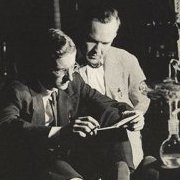-
Posts
4586 -
Joined
-
Last visited
-
Days Won
12
Content Type
Profiles
Forums
Events
Everything posted by hypervalent_iodine
-
Sorry, I should clarify; I do not see your point in the context of this discussion or as it pertains to the OP?
-
I wasn't trying to engage debate about alternitive medicine, I just liked the quote. It was more a round about way of saying what CharonY said; herbal remedies and the like, even if they do work, have not been tested or proven. That is really the main difference. I do not know much about the Burzynski case, though I have certainly heard of him. There are other examples favoured by conspiracy theorist crowds such as the Rife machine, sodium bicarb, hydrogen peroxide and DCA. The arguments associated with these are usually baseless and plain silly. In any case, this is off topic, so I'll stop here (I'd gladly discuss them elsewhere, though). Pharma is certainly far from being angelic. I don't think many people would actually claim otherwise, though the extent of this I think is exaggerated by some. There is fairly active and ongoing research in identifying, isolating and testing the efficacy of the active components of various herbal remedies and I would think that this would be in the interest of BigPharma, since the isolated compounds and their associated formulations would be able to be patented and marketed. For instance, aspirin, though no longer patented, is the active ingredient of willow bark, a herbal remedy that had/has been used since antiquity. I am not sure I see your point. There are obviously things such as blood pressure, obesity and obesity related issues, etc., that are strongly correlated to one's diet. Medication can provide a quick fix for some of these problems, but a change in eating habits and lifestyle is usually the best method for sustained prevention.
-
The definition of a pharmaceutical drug is any chemical that is used therapeutically; that is, for cure, prevention, diagnosis, etc. They are not necessarily derived straight from natural sources. Many and more are entirely synthetic and some are structurally distinct but similar to certain natural products. The difference between that and a straight up herbal remedy is probably best described by this Tim Minchin quote: "“By definition”, I begin “Alternative Medicine”, I continue “Has either not been proved to work, Or been proved not to work. You know what they call “alternative medicine” That’s been proved to work? Medicine.”"
-
Do you have a basic knowledge of chemistry at all? Are you familiar, for instance, with the concept of moles and molarity, etc? If not, I would strongly recommend getting a high school chemistry text and reading through some of the chapters on moles and concentration. You might also want to look at this. It's part of the MIT open courseware suite and I think would be extremely helpful for someone new to practical chemistry. You probably won't need to know all of it, but that very much depends on where you are working (I assume a high school since I would very much doubt any university would employ a scientific officer without significantly more experience and knowledge). As for the glassware, a lot of them have names that make it fairly obvious to tell what they might be and others are ones that most people would be familiar with. For your purposes, what you might like to do is to look up the equipment you have (this will help you in identifying them), and print out the pictures with their names so you have something to refer to when people ask you for glassware. Some items will have more than one name, so be sure to look for that.
-
The process from discovery to market is a very long an expensive one. Rather than rehash it all here, you might like to read the following wiki articles: http://en.wikipedia.org/wiki/Drug_discovery http://en.wikipedia.org/wiki/Drug_development IIRC, it takes close to a billion dollars and anywhere between 10-20 years from start to finish. As for your second question, I'm honestly not sure what you mean. If you are using a chemical in any theraputic sense (be it diagnosis, prevention or treatment), that would make it a drug.
-

New Numerical Methods. The Rational mean
hypervalent_iodine replied to arithmetic's topic in Analysis and Calculus
! Moderator Note This site is not for advertising. If you wish to discuss the topics in your book, you may do so in a new thread. -
Hi Soumya, We don't tend to give out answers for people's homework questions. Would you be able to show us what you've done and where exactly you are struggling?
-

STAR CALENDAR: The Mystery of the clue.
hypervalent_iodine replied to nootelepat's topic in Speculations
! Moderator Note This is the astronomy and cosmoslogy section, not astrology and numerology. Moved to speculations. -
With regards to your last post, I wouldn't worry about it. The time scale they're looking at it day, rather than the second/minutes you'll be working on. I am not as familiar with working with emulsions. My assumption would be that yes, it would not evaporate as quickly or at least not very well if you managed to encapsulate the DCM somehow, but I am not 100% sure on that.
-
No problems. Glad you solved it.
-
Are you familiar with the concept of limiting reagents at all?
-
I'm not sure I understand your questions, so I apologise if I'm off track. Trapped solvent can prevent your compound from crystallising out, but in my experience, DCM doesn't suffer too much from this. EtOAc can be problematic in this sense as it can hydrogen bond to your compound (depending on what your compound is), making it rather difficult to remove (especially if your compound is heat sensitive).
-
If you show me your calculations I can tell you where you might have a problem.
-
Shaking should definitely be enough, though to make extra sure you've gotten rid of the pyridine.HCl, I would wash the DCM layer a few times with fresh HCl.
-
If you got the first question, then this one should be pretty straight forward. What part of it are you struggling with?
-
I guess the first question is do you know what the overall reaction is?
-
DCM is a wonderful solvent and very easy to remove. I used to use it quite frequently for extracting and purifying nitrogenous compounds. If it's specs suit you, then sure, go ahead. As I said before, be wary of getting it on your skin and change your gloves straight away if you get any on them. It will go through your gloves quite quickly and start to burn you; it doesn't hurt, but it is irritating and DCM is fairly toxic. You would substitute the ether for the same volume of DCM (so, 50 mL if you use 0.8 g of the salt).
-
Well, if it isn't soluble or you find you get not much back, there's nothing stopping you from re-extracting the aqueous phase with a different solvent.
-
Ethyl acetate might work, depending on your compound's solubility. You can easily remove it with a rot evap, though you'll likely find that a few traces of solvent remain and that being the case, you'll need a high vac to remove the last of it.
-
Usually a protocol won't specify the sep funnel as it's a given. Judging by this: In general, when it says that a solution is washed as it is here, it means you are doing a liquid-liquid extraction in a separatory funnel. The idea is that you want your impurity (the salt) to be dissolved in a different layer to your product. By performing this in a sep funnel, you can easily remove the initial HCl layer from the organic layer and then remove any trace impurities by putting the organic layer back into the funnel, shaking it with a little more water and once again separating the layers. It will probably have this in the protocol, but also make sure to remove any excess water from your combined organic fractions by adding some magnesium or sodium sulphate and then filtering to remove. There are a lot of YouTube videos on this if you are not familiar with it. Also, if a fumehood is too hard to come by, you will want to at least find somewhere with very good ventilation. I agree ether is probably not the best if a fumehood is not possible, so maybe try toluene. Fair warning though, toluene can take a bit to remove (bp is over 100oC). Do you have access to a rotary evaporator or some kind of vacuum manifold? I would try not to heat your solution to remove the solvent if you are not absolutely sure your compound is heat stable, either, so vacuum is probably your best bet if you use toluene.
-
I would definitely see if you can find a hood to work in. Any solvent you use will be fairly volatile and not something you want to be inhaling for extended periods. Toluene or DCM would work fine and are not as volatile, though the former is still very flammable and the latter is a bit toxic (be wary of getting it on your gloves). Pet spirits (n-hexanes) might also work and would not be as bad as ether (though still quite volatile and flammable). Post #7 looks like a liquid-liquid extraction in a sep funnel.
-

Chemistry Books for high school students!
hypervalent_iodine replied to Trekkie_4_Life_69's topic in Chemistry
The general chemistry texts they use for first years here are 'Chemistry' by Blackman and formerly, a book of the same name by Zumdahl and Zumdahl. I've not have much experience with the Zumdahl book, but Blackman does a fairly good job of covering the basics. There is also, 'General Chemistry,' by Linus Pauling, which is a wonderful book, albeit it slightly outdated. I would probably avoid books targeted at high school students. In my experience, these books tend to lack in a lot of areas and though they may do an okay job at explaining things simply, they often do so at the cost of ingrained misinformation. It will do you no favors if you choose to continue with chemistry after high school, as unlearning bad habits can be quite difficult. If you're after more specialized books, the McMurry one mentioned a few posts up is nice, though I'd prefer 'Organic Chemistry,' by Clayden over that any day of the week. 'Inorganic Chemistry,' by Shriver and Atkins is nice, though not terribly in depth in some places. I have no experience with phys chem texts. -
Any organic solvent is going to pose problems if you don't have a fume hood. I'm curious though, what exactly is it that you're making?
-
It would either be wash step or the OP is precipitating the compound into the aq. HCl and filtering. I would think a wash would be more effective and simpler to deal with, but in either case, the pyridine would form the HCl salt and not be much of a problem in the way you described. I guess we shall never know until the OP comes back to enlighten us. Edit: I assume this because the way it is written seems to me to be more the victim of poor wording rather than bad chemistry (since it is supposedly from a literature source) and doing exactly what is written in the OP, you are right, would make no sense (though not for the reason you have stated).
-
I had assumed that the ether/HCl was a wash step. The HCl would remove the the pyridine.

